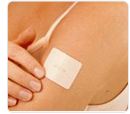
Hormone treatment is regularly used to treat women who are experiencing a loss of libido as a result of reaching a menopausal stage of life. Menopause occurs as a result of a fluctuation in women's hormonal levels during later life. Hormonal therapy to treat this condition ranges from the natural phytoestrogens in herbal products and supplements to the more traditional treatment of hormone replacement therapy (HRT). Both treatments work by addressing the imbalance of hormones in a woman's body. Both treatments carry with them a host of side effects however and because of this, more treatments are constantly being looked at. One of these is the infusion of hormones into a women's body through a testosterone patch in order to treat the symptom of a low libido.

The occurrence of a loss of libido has been specifically noticed in surgical menopausal women. Research has noted that 30-50% of women who undergo oophorectomy, have reduced libidos after surgery. For bilateral oophorectomy the number of women who experience a loss of libido is 50%. While some women enjoy some success with estrogen treatment to strengthen hormone production, for others such a method isn't sufficient. The study however cited that with a transdermal testosterone patch, positive effects were clear. A 300 µg/d dosage increased sexual function among patients who had recently undergone oophorectomy. Such results were encouraging in a variety of efficacy end points (the measuring system used in testing). The reliability of such testing is supported by the use of 3 validated instruments scientifically developed specifically to analyze menopausal women suffering with the effects of a low libido. Hormone therapy in a patch form brings with it certain benefits. This includes an allowance of continuous administration of a drug in a delivery style that doesn't need the drug to pass through the body's first-pass intestinal and hepatic metabolism.
In the constant research into ways to halting the effects of a reduced libido in women, testosterone patches have proven to be an effect method of treating this problem. Such a hormone delivery method has been cited by clinical research as having a consistent benefit in treating the menopause symptom of a low libido in surgical menopausal women.